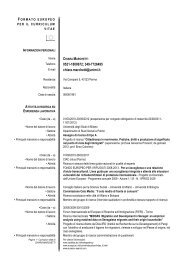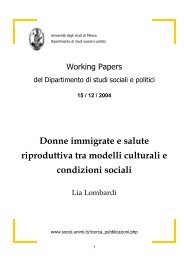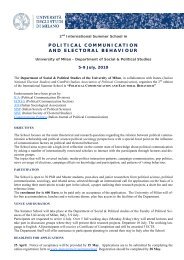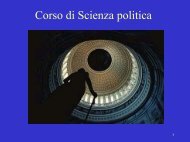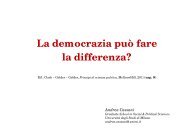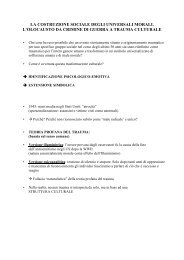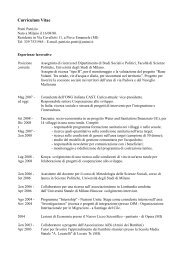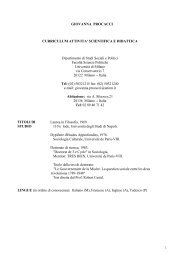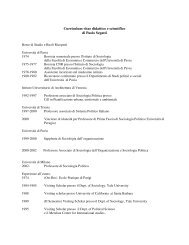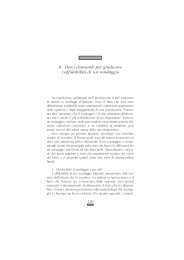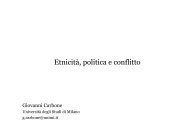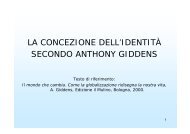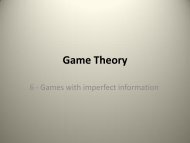The european dimension of political discourse in Italy. A ... - CIRCaP
The european dimension of political discourse in Italy. A ... - CIRCaP
The european dimension of political discourse in Italy. A ... - CIRCaP
Create successful ePaper yourself
Turn your PDF publications into a flip-book with our unique Google optimized e-Paper software.
THE EUROPEAN DIMENSION OF POLITICAL DISCOURSE IN ITALY.<br />
shap<strong>in</strong>g, that is to say a realignment through a “s<strong>of</strong>t” way <strong>of</strong> the elites to present the strategic<br />
evolution <strong>of</strong> this monolithic force. Discont<strong>in</strong>uities are diluted over time and the opposition is<br />
not voiced <strong>in</strong> the party documents. <strong>The</strong> last document <strong>of</strong> the party we have coded <strong>in</strong> this<br />
series, the famous open<strong>in</strong>g speech given by Achille Occhetto <strong>in</strong> the 1991 Congress (mark<strong>in</strong>g<br />
the passage from the Communist party to the Pds), still presents a slightly different<br />
conception <strong>of</strong> Europe: the speech is clearly centred on the idea <strong>of</strong> a modern and “European”<br />
left party, stress<strong>in</strong>g the support to a strong European <strong>in</strong>stitutional enforcement, and to a clear<br />
autonomy <strong>of</strong> the European entity <strong>in</strong> the <strong>in</strong>ternational scenario. On the other hand, the speech<br />
underl<strong>in</strong>es the importance <strong>of</strong> the “tradition <strong>of</strong> autonomy” <strong>of</strong> the Italian left and, to some<br />
extent, it entails an alternative view <strong>of</strong> European <strong>in</strong>tegration. In this regard, we can<br />
hypothesize that, dur<strong>in</strong>g such a sensitive moment <strong>in</strong> the party history, a difference still<br />
emerged between the “<strong>in</strong>ternal” <strong>discourse</strong>, ma<strong>in</strong>ly devoted to defend the traditional “different<br />
vision” <strong>of</strong> Europe, and the “electoral appeal”, centred on the necessity to confirm the pro-<br />
European change <strong>of</strong> the party, and to capture the Europhilia <strong>of</strong> the Italian public op<strong>in</strong>ion.<br />
Psi: a modern left European party constra<strong>in</strong>ed by the Italian reality<br />
<strong>The</strong> dest<strong>in</strong>y <strong>of</strong> the Italian Socialist party, the third party selected for our analysis, has been<br />
traditionally subord<strong>in</strong>ated to the difficult relationship with the two giants <strong>of</strong> the party system <strong>of</strong><br />
the first republic (Merkel 1986). In fact, all the positions expressed by this force on the issue<br />
<strong>of</strong> European Integration have been to some extent <strong>in</strong>fluenced by its peculiar character as<br />
“third actor” <strong>of</strong> the <strong>political</strong> spectrum.<br />
After the war, the subord<strong>in</strong>ation <strong>of</strong> the socialist leaders to the Communist party prevented the<br />
promotion <strong>of</strong> the federalist ideas, which had characterised some sectors <strong>of</strong> its leadership<br />
dur<strong>in</strong>g the years <strong>of</strong> the anti-fascist resistance. <strong>The</strong> <strong>of</strong>ficial documentation reveals a sort <strong>of</strong><br />
“silence” on the European issue <strong>in</strong> the <strong>in</strong>ternal debate, at least until the mid-fifties. <strong>The</strong><br />
electoral manifestos for the 1948 and 1953 elections did not present any reference to the<br />
perspective <strong>of</strong> the <strong>in</strong>tegration <strong>of</strong> Europe. Even the open<strong>in</strong>g speech to an important party<br />
congress (1957), mark<strong>in</strong>g the start <strong>of</strong> a pathway <strong>of</strong> “autonomy” from the Communist party, as<br />
well as the follow<strong>in</strong>g electoral platform, neglected to debate on the future <strong>of</strong> European<br />
Integration. Nevertheless, it is well known that, differently from the Pci apparatus, the<br />
socialist leadership always participated to the European debate on the creation <strong>of</strong> a<br />
“European State”, and its opposition to the “liberal view” <strong>of</strong> the European Integration was<br />
never pr<strong>in</strong>cipled. Already dur<strong>in</strong>g the second half <strong>of</strong> the fifties, the party could del<strong>in</strong>eate its<br />
fully autonomous position on European Integration, vot<strong>in</strong>g <strong>in</strong> favour <strong>of</strong> Euratom and<br />
25



